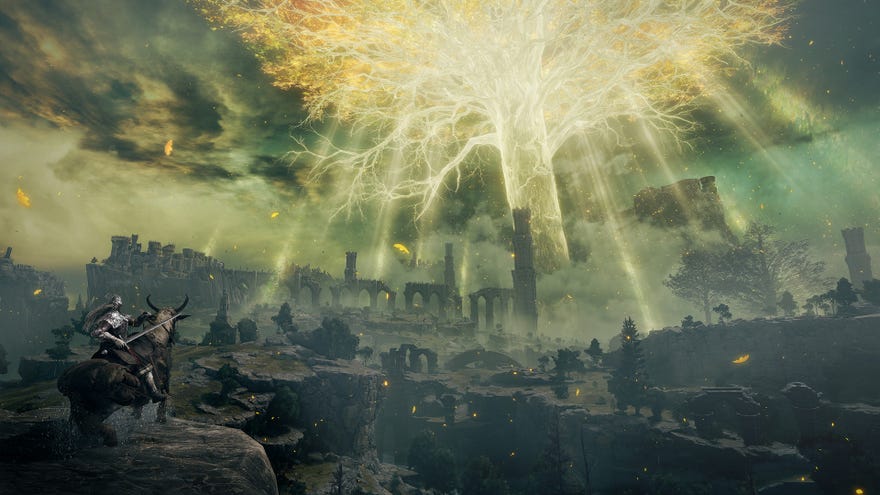Elden Ring character attributes and stats: what do attributes do?
All eight attributes in Elden Ring and their importance to your character
What are attributes in Elden Ring and how do they work? To help your Elden Ring character deal with the many challenges they face in the Lands Between, their strengths and weaknesses are determined by their attributes. These eight traits work together to determine their physical and mental hardiness, prowess in combat, and various other key factors that come into play as they explore the vast open world of Elden Ring.
On this page we go into every attribute and its effects, as well as giving you a few pointers on stat priority, and explaining how starting levels work in Elden Ring.
Elden Ring attributes and stat distribution
There are eight attributes that make up your character's stat build in Elden Ring:
- Vigor is a measure of a character's physical power. Putting points into Vigor increases your character's max HP.
- Mind is a measure of a character's mental power. Putting points into Mind increases your character's max FP (mana).
- Endurance increases your character's stamina bar and how much weight you can equip as part of a single load.
- Strength contributes to your character's physical damage modifier. Higher levels of this stat are a requirement to equip certain Strength-based weapons.
- Dexterity contributes to your physical damage modifier, and higher levels of Dexterity are required in order to equip specific Dexterity-based weapons. However, most weapons in the game have some level of Dexterity requirement to wield, meaning characters with very low Dexterity will struggle to arm themselves. Dexterity also increases your character's casting speed when using magic.
- Intelligence contributes to your character's magic damage modifier. Higher levels of Intelligence are required to cast most Sorceries, and it's a secondary requirement to cast some Incantations.
- Faith contributes to your character's magic damage modifier. Higher levels of Faith are required to cast most Incantations, and it's a secondary requirement to cast some Sorceries.
- Arcane determines your character's Item Discovery rate, and also contributes to their magic damage modifier. Higher levels are a secondary requirement for casting certain Sorceries and Incantations.
During character creation you will need to pick an origin for your character. This is Elden Ring's version of character classes, and there are 10 options to choose from. Stat point distribution among the eight attributes are pre-set for every origin, meaning you don't have the ability to redistribute their starting points. This is both good and bad: good in that every character starts with at least some proficiency in every attribute; bad in that there's no way to tweak your starting build exactly to your liking.
However, as you play through the game, level up and earn Runes, you will have free rein to put points into whichever attributes you want to increase, allowing you to redirect your character's build according to what you want at the time. Started with a Hero character but wish you'd picked Astrologer? It's going to take some investment, but it's never too late to turn your character's life around.
Which attributes are most important?
Attributes are at the core of your character build and you're encouraged to experiment with that, so there's no definitive answer as to which are the best and worst. However, there are a few general pointers that can help you think about how you want to distribute your stat points as you earn them.
While Vigor and Endurance are easy to overlook as their effects are largely passive, it's a very good idea to keep plugging points in every now and then, as they're key to increasing your survivability and helping you get through the game's more difficult encounters. This is true for basically every character, no matter what class or build you're going for.
Strength and Dexterity are necessary for more physically-oriented builds, but while keeping them competitive is important, equipping and upgrading better weapons and armour will do more for your damage and defences overall. Intelligence, Faith, and Arcane play more or less the same role in spellcasting-oriented builds. Always check the stat prerequisites on a weapon or spell before equipping or upgrading it to ensure that you can meet the requirements to wield it.
It's worth knowing that it is possible to respec in Elden Ring once you unlock the ability, so your attribute distribution doesn't need to be final. Respeccing isn't free, so you do still want to put some thought into choosing your stats, but there's no need to sweat every single decision down to the last point. You can even completely change up your build, effectively changing your character class in all but name, if you opt to do this.
Elden Ring starting level explained
Your character will begin the game with a starting level as well as their attribute stats. Like the attributes, starting level varies depending on the origin you choose. The Wretch, as Elden Ring's challenge class, has the lowest starting level at 1; while the highest starting level belongs to the game's unofficial beginner class the Confessor, who starts at level 10.
So what does all this actually mean? Well, it's quite simple: your character's level determines how many attribute points they have. At level 1, the Wretch's total starting stat points add up to 80. At level 10, the Confessor's total tallies at 89. Basically, because the Confessor starts nine levels ahead, they have nine extra attribute points at the start of the game. All of the other classes are somewhere in between and, accordingly, have a number of starting stat points appropriate to their starting level.
As you progress through the game and your character levels up you'll receive one stat point per level, which you can distribute as you choose. You can also use Runes, the in-game currency, to buy more points to put into your attributes. Therefore, your character's starting level isn't something you need to worry about an awful lot, since whichever you choose, you'll soon begin levelling up in-game. Starting level is not even a definitive indicator of each class's difficulty, though broadly speaking the more beginner-friendly classes do tend to have a slightly higher starting level than the more challenging ones.
For further guides to help you make choices during character creation, see our page on the best Keepsakes in Elden Ring to help you pick your starting gift. For advice on which equipment to choose to complement your build, have a look at our pages on the best weapons in Elden Ring and best armor in Elden Ring.










